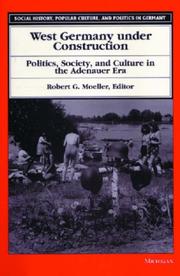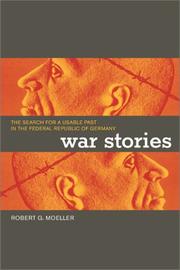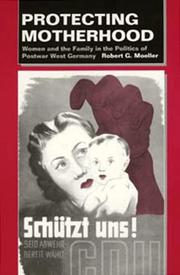| Listing 1 - 10 of 14 | << page >> |
Sort by
|

ISBN: 047206648X 0472096486 Year: 1997 Volume: *9 Publisher: Ann Arbor, Mich University of Michigan Press
Abstract | Keywords | Export | Availability | Bookmark
 Loading...
Loading...Choose an application
- Reference Manager
- EndNote
- RefWorks (Direct export to RefWorks)
Denazificatie --- Denazification --- Dénazification --- Reconstruction (1939-1951) --- Military government --- Jews --- Denazification. --- Reconstruction, 1939-1951 --- Gouvernement militaire --- Juifs --- Germany --- Allemagne --- Economic conditions --- Conditions économiques --- DE / Germany - Duitsland - Allemagne --- 331.100 --- 92 --- 335.6 --- Economische geschiedenis: algemeenheden. --- Geschiedenis. --- Liquidatie van de oorlogseconomie: economische demobilisatie en herstel. Marshall Plan. --- Histoire. --- History. --- 92 Geschiedenis. --- 92 Histoire. --- 92 History. --- Dénazification --- Conditions économiques --- Military rule --- Public administration --- Civil-military relations --- Military occupation --- Economische geschiedenis: algemeenheden --- Liquidatie van de oorlogseconomie: economische demobilisatie en herstel. Marshall Plan --- Geschiedenis --- 1945-1990 --- Reconstruction (1939-1951) - Germany. --- Military government - Germany. --- Jews - Germany.
Book
ISBN: 0049430378 Year: 1986 Publisher: Boston (Mass.) : Allen and Unwin,
Abstract | Keywords | Export | Availability | Bookmark
 Loading...
Loading...Choose an application
- Reference Manager
- EndNote
- RefWorks (Direct export to RefWorks)
Peasants --- Peasant uprisings --- Farm tenancy --- Agriculture and state --- Paysannerie --- Révoltes paysannes --- Baux ruraux --- Politique agricole --- History --- Histoire --- -Farm tenancy --- -Peasant uprisings --- -Peasantry --- Agricultural laborers --- Rural population --- Marks (Medieval land tenure) --- Villeinage --- Peasants' uprisings --- Uprisings, Peasant --- Insurgency --- Revolutions --- Leases, Usufructuary --- Tenant farming --- Usufructuary leases --- Agricultural contracts --- Land tenure --- Landlord and tenant --- Tenant farmers --- Agrarian question --- Agricultural policy --- Agriculture --- State and agriculture --- Economic policy --- Land reform --- Law and legislation --- Government policy --- History. --- -History --- Révoltes paysannes

ISBN: 0520930312 1597349860 9780520930315 0585390274 9780585390277 0520223268 9780520223264 0520239105 9780520239104 9781597349864 Year: 2001 Publisher: Berkeley University of California Press
Abstract | Keywords | Export | Availability | Bookmark
 Loading...
Loading...Choose an application
- Reference Manager
- EndNote
- RefWorks (Direct export to RefWorks)
Robert G. Moeller powerfully conveys the complicated story of how West Germans recast the recent past after the Second World War. He rejects earlier characterizations of a postwar West Germany dominated by attitudes of ""forgetting"" or silence about the Nazi past.
Forced repatriation. --- German. --- Germans. --- History. --- Political refugees. --- Political refugees-- Germany (West)-- History. --- Population transfers. --- Population transfers - Germans. --- World War, 1939-1945. --- World War, 1939-1945 - Forced repatriation. --- Political refugees --- World War, 1939-1945 --- Population transfers --- Germans --- History - General --- History & Archaeology --- Ethnology --- European War, 1939-1945 --- Second World War, 1939-1945 --- World War 2, 1939-1945 --- World War II, 1939-1945 --- World War Two, 1939-1945 --- WW II (World War, 1939-1945) --- WWII (World War, 1939-1945) --- History, Modern --- Asylum seekers --- Refugees, Political --- Refugees --- History --- Forced repatriation --- Réfugiés politiques --- 2ème guerre mondiale --- Transferts de population --- Allemands --- Histoire --- Rapatriement forcé
Article
Abstract | Keywords | Export | Availability | Bookmark
 Loading...
Loading...Choose an application
- Reference Manager
- EndNote
- RefWorks (Direct export to RefWorks)
Book
ISBN: 1845459989 9781845459987 9781845457327 1845457323 Year: 2010 Publisher: New York : Berghahn Books,
Abstract | Keywords | Export | Availability | Bookmark
 Loading...
Loading...Choose an application
- Reference Manager
- EndNote
- RefWorks (Direct export to RefWorks)
In 1945, Europeans confronted a legacy of mass destruction and death: millions of families had lost their homes and livelihoods; millions of men in uniform had lost their lives; and millions more had been displaced by the war's destruction, and the genocidal policies of the Nazi regime. From a range of methodological historical perspectives--military, cultural, and social, to film and gender and sexuality studies--this volume explores how Europeans came to terms with these multiple pasts. With a focus on distinctive national experiences in both Eastern and Western Europe, it illuminates how postwar stabilization coexisted with persistent insecurities, injuries, and trauma.
Reconstruction (1939-1951) --- World War, 1939-1945 --- Collective memory --- Memory --- Group identity --- Citizenship --- Military art and science --- Fighting --- Military power --- Military science --- Warfare --- Warfare, Primitive --- Naval art and science --- War --- Birthright citizenship --- Citizenship (International law) --- National citizenship --- Nationality (Citizenship) --- Political science --- Public law --- Allegiance --- Civics --- Domicile --- Political rights --- Collective identity --- Community identity --- Cultural identity --- Social identity --- Identity (Psychology) --- Social psychology --- World War, 1939-1945, in motion pictures --- Retention (Psychology) --- Intellect --- Psychology --- Thought and thinking --- Comprehension --- Executive functions (Neuropsychology) --- Mnemonics --- Perseveration (Psychology) --- Reproduction (Psychology) --- Collective remembrance --- Common memory --- Cultural memory --- Emblematic memory --- Historical memory --- National memory --- Public memory --- Social memory --- National characteristics --- Influence. --- History --- Social aspects --- Motion pictures and the war. --- Law and legislation --- Europe
Book
ISBN: 9781845457327 Year: 2010 Publisher: New York : Oxford : Berghahn Books,
Abstract | Keywords | Export | Availability | Bookmark
 Loading...
Loading...Choose an application
- Reference Manager
- EndNote
- RefWorks (Direct export to RefWorks)
Reconstruction (1939-1951) --- World War, 1939-1945 --- Collective memory --- Memory --- Group identity --- Citizenship --- Military art and science --- Influence. --- History --- Social aspects --- Motion pictures and the war. --- Europe

ISBN: 0520079035 0520205162 0585181543 Year: 1993 Publisher: Berkeley : University of California Press,
Abstract | Keywords | Export | Availability | Bookmark
 Loading...
Loading...Choose an application
- Reference Manager
- EndNote
- RefWorks (Direct export to RefWorks)
Women --- Motherhood --- Family policy --- Women's rights --- Femmes --- Maternité --- Politique familiale --- Government policy --- Politique gouvernementale --- Droits --- Gender & Ethnic Studies --- Social Sciences --- Gender Studies & Sexuality --- Maternité --- Maternity --- Human females --- Wimmin --- Woman --- Womon --- Womyn --- Mothers --- Parenthood --- Females --- Human beings --- Femininity
Periodical
Year: 2000 Publisher: Oxford New York Oxford University Press
Abstract | Keywords | Export | Availability | Bookmark
 Loading...
Loading...Choose an application
- Reference Manager
- EndNote
- RefWorks (Direct export to RefWorks)
Book

ISBN: 9780857457042 Year: 2007 Publisher: New York Oxford
Abstract | Keywords | Export | Availability | Bookmark
 Loading...
Loading...Choose an application
- Reference Manager
- EndNote
- RefWorks (Direct export to RefWorks)
Multi

ISBN: 9780857457042 Year: 2007 Publisher: New York; ; Oxford Berghahn Books
Abstract | Keywords | Export | Availability | Bookmark
 Loading...
Loading...Choose an application
- Reference Manager
- EndNote
- RefWorks (Direct export to RefWorks)
| Listing 1 - 10 of 14 | << page >> |
Sort by
|

 Search
Search Feedback
Feedback About UniCat
About UniCat  Help
Help News
News